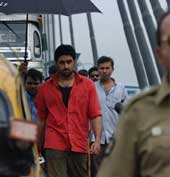|
|
| Traffic-Stopper: Abhishek Bachchan makes his way through a maze of vehicles halted by the shooting |
Budge Budge.
nShooting of films on important city roads should be banned to avoid traffic snarls leading to a collapse of normal life. But shooting may be allowed on unimportant roads from where traffic can be diverted; of course, with prior intimation to the public.
Sachindranath Mitra,
Beleghata.
Yes, shooting of films must be banned on city roads. Most of the films are commercial ventures, full of crime and violence, without a social message. So, why should people suffer traffic jams on roads that have been constructed with money from their taxes? Exceptions can be made only for those who are making meaningful films about the poor and showing ways to get rid of poverty. They can use the roads for shooting as they are serving the interests of society.
Fakhre Alam,
Tiljala Lane.
Shooting of films cannot be confined indoors. Outdoor filming is required, to give the movies a ‘real’ look. Besides, movies are not just entertainment. They are a medium of education and information. Directors often try to convey messages through their movies, which are related to our lives. Also, if people get a chance to see their favourite actors live in action, why deprive them? Shooting of films on city roads creates less chaos and confusion than rallies. The authorities should undertake adequate measures to minimise inconvenience during shooting on roads.
Sandipan Dutta,
Haridebpur.
Film shootings can be held on city roads between midnight and 5 am, so as not to disturb traffic movement and inconvenience people. In many sequences, street views are essential, like when portraying accidents or car chases. There is no harm in allowing filming on city streets after midnight.
P. Pramanik,
Santoshpur Avenue.
If the police are sensible, the question of banning filming on city roads does not arise. Why can they not assess the implications on traffic movement beforehand, if permission for shooting films is given on a busy road during peak hours? The film-makers are well aware of how to shoot scenes essential for their films, but they do so in public places for cheap advertisement.
Moupiali Mahalanobis,
Dhakuria Station Lane.
It depends on the importance of the road. If it is a busy thoroughfare, connecting vital points of the city, it must not cater to shooting needs in the daytime, especially during office hours. Holidays and late night can be given a try.
Avishek Ganguly,
Bally, Howrah.
The people’s civic rights can never be put at stake for the sake of entertainment. It is surprising that Calcutta Police permitted filming on busy roads, ignoring the sufferings of hundreds of commuters. In the West, outdoor shooting on busy roads is seldom allowed. When they are, guidelines are set. The fact that permission was granted proves the callous attitude of our administration, which turns a blind eye and deaf ear to the people’s well-being. The judiciary should step in, so that common people are not unnecessarily harassed.
Amitava Mukherjee,
NC Pukur, Barrackpore.
Yes, I think shooting of films should be banned on city roads. It causes too many problems. If any city road gets taken over by big screen stars, people have to suffer through the resultant chaos. Even filming for TV serials and music videos cause traffic pains. They, too, should be banned on roads.
Bhupen Bose,
Dum Dum Park.
The population of our city is ever-increasing. However, our roads are limited and in certain areas, they cannot be widened since there are buildings on either side. During office hours, lakhs of people travel to the city from the suburbs. Rallies, meetings and several other activities keep the roads perpetually crowded. Shooting of films on city roads create more traffic jams, adding to the chaos.
Anandarup Ghoshal,
Address not given.
We have to remember that films are great entertainment, the film industry is a part of our economy and it also keeps our culture alive. From that point of view, we have to make sacrifices upto a certain stage. But nowadays, Calcutta is overcrowded and there is heavy traffic on weekdays. The filmstars never face this situation and escape the jam escorted by pilot cars. Common people first need foods and then entertainment. So if shooting is causing problems for our daily traffic, then it should be banned on busy city roads on weekdays.
Sandhya Banerjee.
Salt Lake.
All the metropolitan cities have spacious roads and highways and these can be utilised for cinema shootings. If shooting takes place on highways, the public will have a direct view of their favourite stars. Youngsters who want to join films will avail of the golden opportunity of directly interacting with a film crew.
Santosh Chakravarty,
Unique Park.
It is not necessary to cut off the head to prevent a headache, but there should be proper treatment. It is not necessary to ban shooting of films on city roads, but there should be control. First, the hours of shooting should be fixed as to not disrupt traffic movement. To make the scene realistic, proper technological devices and some marginal adjustments may be made. Second, the requisite fees should be paid by the film-maker in advance to the authority for cleaning/repairing the involved portion of the road after the shooting is over.
Pratika Gupta.
Kankurgachhi.
Definitely! The flyover which got clogged due to the recent shooting stint by Mani Rathnam’s unit was constructed to avoid these jams.











